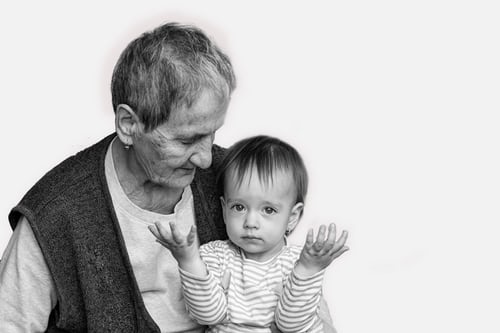27 January 2022
Being Safe
Parties and the precautionary principle.
By Lynda Goetz

One of those odd little items of news last week was that of the 91 year-old in Italy who died attempting to escape from his Italian care home. Allison Pearson uses this story as an opening to an article entitled ‘Killers have more rights than care home inmates’ decrying the ongoing and inhumane restrictions still being enforced in this country too, supposedly for the well-being of inmates.
The story instantly called to mind the comic novel by Swedish writer Jonas Jonasson, The Hundred Year-Old Man Who climbed out of the Window and Disappeared, which I read to my father as he lay in hospital dying from a stroke at the age of a hundred. In the story, Allan Karlson is about to celebrate his hundredth birthday and his care home is laying on a party. Unlike Boris, Allan is not a party man and instead, climbs out of the window and walks to the bus station, intending to travel as far as his money will allow. A bizarre series of events follows as Allan is pursued by both the police and the drugs gang whose money he has picked up in the suitcase he was asked to look after at the bus station. Flashbacks to the outlandish exploits of his earlier life are interspersed with ongoing events. Even at a hundred he had a life to lead.
A member of staff at the Italian care home where the 91 year-old, Mario Finotti, died, expressed the view that, “It was unclear what was going on in his head because he was calm from a psychological standpoint” and that he was “in good health with no signs of degenerative disease”. Caregivers and friends speculated that Mario might have been lonely after family visits were halted due to Covid. ‘Might’? Even at the best of times, many retirement and care homes are not places the old want to be. They are there because of the inability of modern families to take on the responsibility of caring for them. Some admittedly choose them as an alternative to ‘being a burden’ on family. Some even enjoy them as Diana Athill was able to testify when she described the Mary Fielding Guild retirement home* as ‘a dream’.
Since Covid, the restrictions in care homes have been draconian and owing to legislation it is usually not even possible for families to remove a family member from a care home (citing the patient’s supposed ‘best interest’). The numerous cases given by Ms Pearson in her article were shocking and anger-provoking. It is experiences such as these which have elevated the anger at the ‘partygate’ scandal to the level it has reached. That many of the Covid rules were idiotic, nonsensical and in place for ostensible theatre rather than for their actual effectiveness has been apparent, particularly since the vaccination roll-out. That the government which put them in place appears in a number of instances to have ignored them, whilst the rest of the population has largely felt obliged to follow them to the letter (denying access to the vulnerable and those at the end of their life, inter alia) has provoked some justifiable anger.
At the same time as the old and the dying have been prejudiced by the Covid regulations, so too have the young and the healthy. Children and students have fared extremely badly in the Covid lottery. They, like the old, continue to do so. Plan B Covid restrictions introduced because of the Omicron variant are being lifted on 27th January. However, care home residents are deemed (understandably) to be vulnerable and there are specific rules around care home visiting which remain in place. In the case of children and students, teaching unions seem determined that pre-Covid education should not be resumed until every single element of risk has been removed. Risk, it has to be said, not to the students or schoolchildren, but to the teaching staff. True, a survey in November did find that ‘People working in the education sector continued to be more likely to test positive for COVID-19 in comparison with other working adults in the fortnight ending 28 November 2021; the higher risk is likely related to the recent high infection levels among school-aged children. – Coronavirus (COVID-19) Infection Survey, characteristics of people testing positive for COVID-19, UK: 16 December 2021’ (my italics)
However, although these findings were possibly amongst the reasons that led to the requirement that secondary school pupils once again be required to wear masks in classrooms and take twice-weekly lateral flow tests, it should be noted that these were simply people ‘testing positive’; not those ill or seriously ill with Covid. Children may have been found to be spreading the very transmissible but mild Omicron variant, but neither they nor the teachers were dying from it.
A few days ago Michelle Donelan, the universities minister, suggested that students who were dissatisfied with what their universities were offering should make their views known and even apply for refunds if they were not satisfied. She criticised the way many universities had failed to return to face-to-face teaching. Students’ experiences at universities have very largely been negative over the last two years, with many confined to their rooms doing courses online. Social interaction has been minimal or non-existent and for many the university experience has been a bitter disappointment.
In schools, students have likewise been disadvantaged by the way teaching has been delivered and have suffered from a complete lack of the normal social interactions essential to children’s lives and development. Teaching unions have, at every turn, applied ‘the precautionary principle’ and children of all ages felt they were viewed as vectors of a disease potentially dangerous to their grandparents and vulnerable relatives but of little or no danger to themselves. Because of the way rules have been imposed and interpreted everything about their lives has been disrupted. This endless disruption has led to exams being cancelled and replaced by Teacher Assessed Grades (TAGs), which initially for some seemed like a reprieve, but has ended up simply meaning more continuous testing and yet another nail in the coffin of their education.
Boris Johnson may not be anyone’s idea of a perfect Prime Minister, but was there ever such a being, anyway? Perhaps the storm in a plastic wine glass that is ‘Partygate’ should be put behind us and the government focus on governing a country, desperate, like many others around the world, for focused leadership. Boris, as his supporters repeatedly point out, has got Brexit done (even if there is a way to go to realise the full potential of this event); he has achieved a very successful vaccine rollout and he appears to be starting to listen to a more diverse range of scientific opinions on dealing with what most of us (?) believe should be the end of the pandemic. Restrictions are being lifted and life is, albeit rather slowly, getting back to whatever counts as normal. Should we be allowing overly cautious teaching unions and care home staff to dictate the lives of the young and the old? The young have their lives to live; so too the old. The latter have less time left. If they are aware, do they really want to be ‘kept safe’ at the expense of being able to do those things which make life worth living? The fictitious Allan Karlson may not have wanted to party, but he still wanted to live; as did the real Mario Finetti, who died climbing out of the window in his attempt to do so.
In a scholarly article published in 2007 by Martin Peterson, a research fellow in the History and Philosophy of Science at the University of Cambridge, he argues perhaps controversially that the precautionary principle should not be used for decision-making. Leaving aside the more complex and erudite aspects of his arguments, he points out that “numerous authors and organizations have formulated the precautionary principle in slightly different ways, but the basic message is the same: it is better to be safe than sorry (my italics). Whilst many would go along with this, his argument in its simplest form is that, ‘the precautionary principle… replaces the balancing of risks and benefits with what might best be described as pure pessimism’. Perhaps, when future generations evaluate the world’s reactions to Covid 19 they will conclude that the lack of cost/benefit analysis applied in imposing restrictions resulted in outcomes more damaging than the virus.
Ignoring the economy, the cost of living crisis, the potential war in Ukraine and so many other serious issues in favour of focusing on the outcome of Sue Gray’s report on Partygate could prove extremely damaging not only to the Tory party but the country. We may not want Boris to party, but he should not be defenestrated just yet. The alternatives are not really more appealing. Perhaps the precautionary principle does apply here; expressed in this instance as ‘better the devil you know than the devil you don’t’.
*This was closed by new owners last year
Cover page image: Sergiu Valenas


